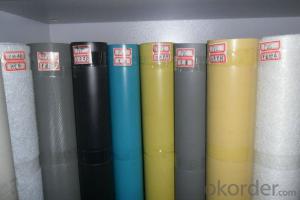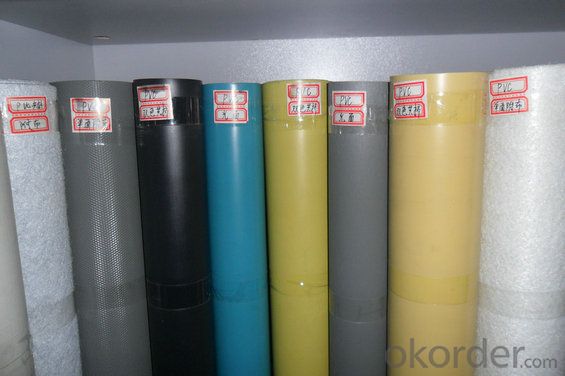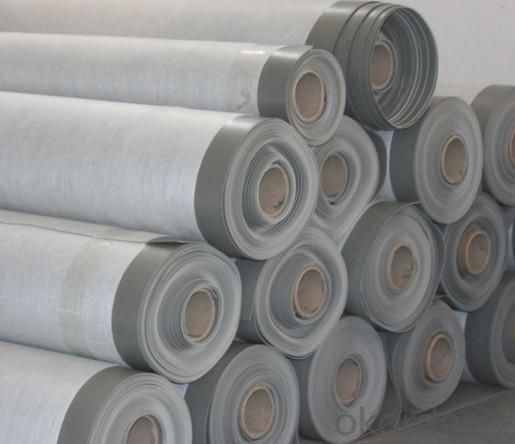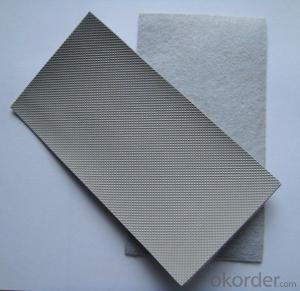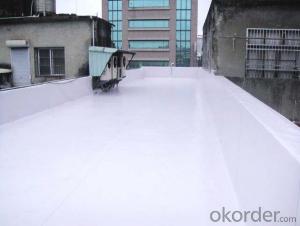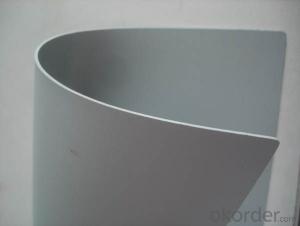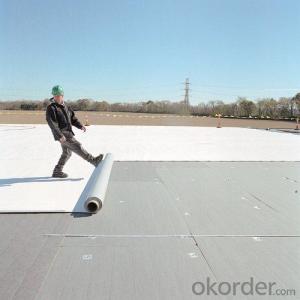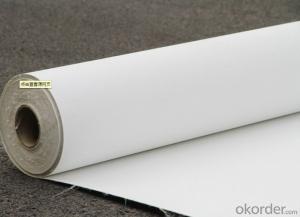PVC Waterproofing Membrane for Water Filter
- Loading Port:
- China main port
- Payment Terms:
- TT OR LC
- Min Order Qty:
- 5000 m²
- Supply Capability:
- 100000 m²/month
OKorder Service Pledge
OKorder Financial Service
You Might Also Like
1. Introduction of PVC Waterproofing Membrane
Polyvinyl chloride the pvc waterproofing plastic membrane is a kind of excellent performance of polymer waterproof material,PVC resin as the main raw material,add all kinds of special additive and anti-aging composition,the use of advanced equipment and advanced technology extrusion rolling is made.The product has the tensile strength and elongation high shrinkage of small,low temperature soft good,long life and other advantages, the products wide 1.2m to 3.0m, the thickness of 0.8-2.0 mm(special specifications can be customized),stable performance,reliable quality,construction is convenient.
2. Specification of PVC Waterproofing Membrane
Length | 20m/roll or customized |
Width | 2.05m |
Thickness | 1.2mm; 1.5mm; 2.0mm |
Type | Homogeneous, Reinforced, Fabric back |
If Exposed | Exposed and Non-exposed |
Color | White, Grey or customized |
3. Characteristic of PVC Waterproofing Membrane
1.Strong tensile strength, high elongation, can fit big deformation of substrates.
2.Excellent anti-extreme weather property, can adapt to various environment temperature difference.
3.Suitable for exposed projects with long lifetime and good anti-aging property.
4.Can be welded firmly and reliably.
5.Outstanding root penetration resistance, best choice for planted roofs.
6.Simple and fast construction without pollution.
7.Great plasticity and fast treatment with corners and details.
4.Applicable scope
PVC sheet forms an effective barrier to liquid water or water vapor in the roof construction for industrial and civil engineering, underground engineering such as subway& tunnel, water conservancy such as water pools & ditch, shelter, grain depot, land filling, dyke, sewage treatment and basement.
5.Cautions
1.Do not put the membrane on a pollution, water and ice ground.
2.Construcion of waterproof layer operations can't be crossed, device shall be installed on the waterproof layer, parts should be done to strengthen the basis of device and to take protective measures.
3.Do not touch the waterproof layer with thorn sharp objects after it's has been completed, don't put sundries or any additional buildings above the waterproof layer to avoid damaging it.
6. FAQ of PVC Waterproofing Membrane
a.Can we get some samples before place order?
Answer: We can send the free samples to you by freight collect.
b.How many years can your PVC membrane guarantee?
Answer: We will guarantee the quality for 5 years at least.
c.Which countries you ever export the product?
Answer: We export the PVC membrane to South Africa, Middle east and even European countries.
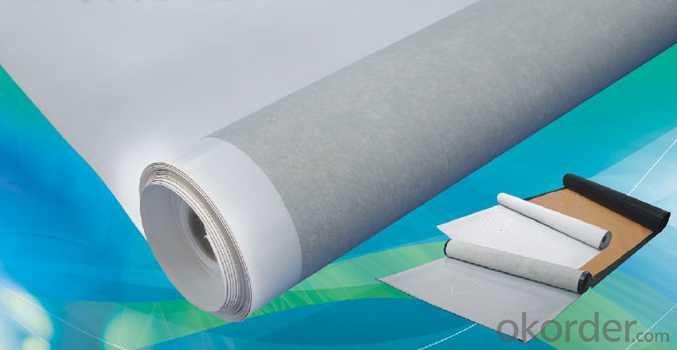
- Q: Can a waterproofing membrane be used in conjunction with building code requirements?
- Indeed, the application of a waterproofing membrane can be utilized alongside the mandates of the building code. The building codes commonly necessitate sufficient safeguard against moisture, particularly in regions susceptible to water seepage like basements, bathrooms, and roofs. Waterproofing membranes are deliberately crafted to establish a barrier that thwarts water infiltration, thereby bestowing an extra shield against predicaments stemming from moisture such as leaks, mold, and structural deterioration. Through the adoption of a waterproofing membrane that satisfies or surpasses the prerequisites stipulated in the building code, constructors and contractors can guarantee adherence to the regulations while simultaneously bolstering the sturdiness and durability of the edifice.
- Q: Can a waterproofing membrane be used in conjunction with vapor barriers?
- Yes, a waterproofing membrane can be used in conjunction with vapor barriers. While a waterproofing membrane protects against liquid water infiltration, a vapor barrier is designed to prevent the passage of moisture vapor. By combining both, you can effectively protect a structure from both liquid water and moisture vapor, ensuring a comprehensive moisture management system.
- Q: Can a waterproofing membrane be used for sealing pipe penetrations?
- Yes, a waterproofing membrane can be used for sealing pipe penetrations. Waterproofing membranes are specially designed to create a barrier against water intrusion and can effectively seal various types of penetrations, including pipes. They are commonly used in construction projects to prevent water leaks and damage. By applying the waterproofing membrane around the pipe penetration, it creates a watertight seal that prevents water from entering or escaping through the opening. This helps to maintain the integrity of the building envelope and protect against potential water-related issues, such as leaks, mold growth, and structural damage. Additionally, waterproofing membranes are often flexible, allowing them to adapt to the shape and size of the pipe penetration, ensuring a secure and durable seal.
- Q: Does a waterproofing membrane require any curing time?
- Yes, a waterproofing membrane typically requires a curing time. The curing time allows the membrane to fully bond and form a tight seal, ensuring maximum effectiveness in preventing water penetration. The specific duration of curing time may vary depending on the type of membrane and manufacturer's instructions.
- Q: Can a waterproofing membrane be used on adobe block surfaces?
- Indeed, adobe block surfaces can be treated with a waterproofing membrane. These blocks, composed of a blend of clay, sand, and straw, are prone to water damage. By applying a waterproofing membrane, the infiltration of water can be prevented, thus safeguarding the adobe blocks against various moisture-related problems like cracking, erosion, or mold formation. It is essential to verify that the waterproofing membrane is suitable for adobe surfaces and adhere to the manufacturer's instructions for application. Furthermore, prior to applying the membrane, it is vital to adequately prepare the surface and address any preexisting damages to ensure optimal performance.
- Q: Roof SBS waterproofing membrane can not empty shop
- 3, under normal circumstances, with ordinary SBS coil roof waterproof, to Shitao as well, to prevent the emergence of a little water into the overall failure of the string of water phenomenon.
- Q: Can a waterproofing membrane be used in geotechnical applications?
- Indeed, geotechnical applications can make effective use of waterproofing membranes. These membranes are commonly employed to safeguard structures against water infiltration and are applied to various surfaces such as roofs, basements, and foundations. In geotechnical applications, these membranes serve the purpose of preventing water from seeping into the soil, thus averting erosion and stabilizing slopes. They can be positioned either horizontally or vertically to establish a barrier that hinders water penetration, which proves particularly advantageous in retaining walls, embankments, and dams. Furthermore, waterproofing membranes can be used to regulate water flow and enhance drainage in geotechnical projects. All in all, incorporating a waterproofing membrane into geotechnical applications can significantly enhance the longevity and performance of structures while effectively safeguarding them against water-related issues.
- Q: Can a waterproofing membrane be used in hospitals or healthcare facilities?
- Yes, a waterproofing membrane can be used in hospitals or healthcare facilities. In fact, it is highly recommended to use waterproofing membranes in these settings due to the critical need for maintaining a clean and hygienic environment. Waterproofing membranes are typically applied on floors, walls, and ceilings to prevent water or moisture infiltration, which can lead to mold growth, deterioration of building materials, and compromise the structural integrity of the facility. By using waterproofing membranes, healthcare facilities can effectively protect against water damage, facilitate easier cleaning and maintenance, and prevent the growth of bacteria and other harmful microorganisms. Additionally, waterproofing membranes can also help in managing moisture levels, thereby reducing the risk of slips and falls, which is especially crucial in areas where patients, staff, and visitors frequent. Overall, waterproofing membranes are a valuable asset in ensuring the safety, durability, and cleanliness of hospitals and healthcare facilities.
- Q: Can waterproofing membranes be used on mechanical rooms?
- Yes, waterproofing membranes can be used on mechanical rooms. These membranes are designed to provide a protective barrier against water infiltration, making them suitable for use in areas prone to moisture or water exposure, such as mechanical rooms.
- Q: Can a waterproofing membrane be used on below-grade walls?
- Yes, a waterproofing membrane can be used on below-grade walls. In fact, it is highly recommended to use a waterproofing membrane on below-grade walls to protect them from water infiltration and moisture damage. Below-grade walls are particularly vulnerable to water penetration due to their proximity to the ground and potential for hydrostatic pressure. A waterproofing membrane acts as a barrier, preventing water from seeping into the walls and causing issues such as mold, mildew, rot, and structural damage. It helps to keep the interior of the building dry, preventing potential moisture-related problems.
Send your message to us
PVC Waterproofing Membrane for Water Filter
- Loading Port:
- China main port
- Payment Terms:
- TT OR LC
- Min Order Qty:
- 5000 m²
- Supply Capability:
- 100000 m²/month
OKorder Service Pledge
OKorder Financial Service
Similar products
Hot products
Hot Searches
Related keywords
